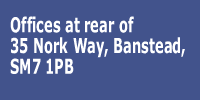Case Study - If offered a "FREE" will by a bank or solicitor
Beware! Your family could end up paying 10 times more than they need to for your Probate
Paul Jones died leaving an estate of £1 million. He had appointed a high street bank to act as his executor. His wife asked us if she really had to let the bank act. We arranged for the bank to renounce their executor-ship
This saved Susan £38,000 as the bank were going to charge their standard fee for acting which is 4% i.e. £40,000!
We charged a fee of £2,000 based on time spent dealing with the probate at our normal rate.
Case Study - Handling the Probate yourself.
It can prove false economy to do the Probate yourself.
Paul Jones came to see us about his Inheritance Tax planning, as both his parents had just died. He had dealt with their probate himself, and he had paid £19,500 IHT to the taxman. He didn't want his children to have to do the same when he died.
We advised him to effect a deed of variation of his mother's will(she had died first) to leave her share of his parent's house to a discretionary trust instead of to her husband.
This provided a 15% discount on the value of his father's share of the property (certain rules that the taxman applies allowed for this). We submitted a corrective affidavit to the taxman and Paul received a cheque from the taxman of £19,500 so no tax was payable.
We also helped Paul avoid IHT on his own estate!
PROBATE - NEED HELP?
Avoid financial and legal stress at a time of great emotional heartache.
Commonly asked questions about Probate?
-
What is Probate?
Probate is the "winding up" of someone's estate after they die. It essentially means testing the validity of their Will and carrying out the wishes of the deceased.
It involves liaising with a whole range of people such as funeral directors, debtors, creditors, Inland Revenue, estate agents, banks, building societies, insurance companies, surveyors, company registrars and the Probate Registry.
-
When do things happen?
Obviously nothing happens until someone dies. Probate cannot be applied for until all of the deceased person's assets and liabilities have been identified and valued.
A fairly typical completion time is 10 to 14 weeks after death for a simple estate.
-
What needs to be done?
Once all the details of the person's assets and liabilities have been gathered, the Inland Revenue Inheritance Tax forms need to be completed and an oath for executors must be sworn and then submitted to the Probate Registry.
-
Can a layman do it?
Anyone can apply for a grant of probate. If the estate is small and simple, it could possibly be done by a layman. Most people, however find themselves unable to deal with the major legal and financial issues involved when they are struggling to cope with the emotions of bereavement and the recent loss of a loved one.
This is why so many people ask professional administrators to act on their behalf. You certainly do not want to add legal stress to the heartache of the bereavement of a loved one.
The additional benefit of using a professional is when the estate is over a £325,000 pounds. It is possible that substantial savings can be made by avoiding or limiting Inheritance Tax. An Inheritance Tax Specialist is certainly required in those circumstances.
-
Can a Will really be changed after someone dies?
Yes!
If there is no will or a Will is not tax efficient, it is possible to change a Will within 2 years of death to save £125,000 or more in Inheritance Tax. This involves a Post-death Deed of Variation but requires the agreement of all relevant beneficiaries.
-
How much does Probate cost?
Using a professional can often lead to a variety of different charging methods.
Some companies, especially some banks, sadly charge a fee of around 4% of the estate! This can obviously be very expensive.
Some companies charge a fixed fee irrespective of the size of the estate and how simple and straightforward it might actually be.
Other companies, like us, only charge for the specific necessary hours required to complete the probate process. Thereby reducing the overall fee substantially. It is well to make sure you do not pay more than is really strictly necessary.


